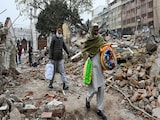- US surgeons performed the world's first human bladder transplant on May 4.
- The eight-hour surgery took place at Ronald Reagan UCLA Medical Center.
- Oscar Larrainzar, 41, received a kidney and bladder from a single organ donor.
In a revolutionary medical breakthrough, US surgeons have successfully performed the world's first human bladder transplant. The complex eight-hour procedure was carried out on May 4, 2025, at the Ronald Reagan UCLA Medical Center in Los Angeles. The recipient, 41-year-old Oscar Larrainzar, a husband and father of four, had been relying on dialysis for seven years after losing both kidneys and most of his bladder to cancer.
The surgical team, led by urologists Nima Nassiri from UCLA and Inderbir Gill from USC, transplanted a kidney and bladder from an organ donor. The new kidney immediately began producing urine, and Larrainzar's kidney function improved instantly, eliminating the need for dialysis. He was able to urinate normally just hours after the surgery, a function he hadn't been able to perform in seven years.
"Bladder transplantation has been Dr Nassiri's principal academic focus since we recruited him to the UCLA faculty several years ago," said Dr Mark Litwin, UCLA Urology Chair, "It is incredibly gratifying to see him take this work from the laboratory to human patients at UCLA, which operates the busiest and most successful solid-organ transplant program in the western United States."
"This first attempt at bladder transplantation has been over four years in the making," Nassiri said. "For the appropriately selected patient, it is exciting to be able to offer a new potential option."
This pioneering surgery could change the lives of millions worldwide suffering from bladder impairment. Previously, patients with severely impaired bladders had limited options, including repurposing part of their intestines, which often led to complications. The bladder transplant, however, offers new hope with potentially fewer risks.
The medical team spent over four years preparing for this surgery, practising robot-aided transplants on dead donors. Four more surgeries are planned for the clinical trial, with patients requiring long-term immunosuppression to prevent organ rejection. If successful, a larger trial will follow. Larrainzar's surgery marks a historic moment in medicine, and his road to recovery brings hope to many.















